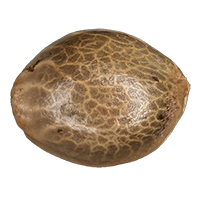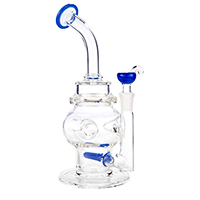CBD in dogs: It helps!

Our dog is part of the family and the worst thing is when we have to see him in pain and suffering. It's especially hard because the dog can't tell us what's really wrong with him and it's hard for us to tell him that everything will be okay. Since cannabis has become so popular with humans because of its many medicinal uses, some veterinarians are also wondering to what extent cannabis could also help pets.
It had been shown that many dogs react very well to a special chemical component in cannabis, namely CBD (cannabidiol). However, dog owners should bear in mind that one must generally be careful with the administration of cannabis to dogs. While CBD is generally well tolerated by dogs, THC is toxic for dogs and even dangerous. It should therefore be avoided in any case to give THC or THC-containing plant parts to the dog.
However, CBD seems to have a calming and balancing effect in all mammals, as well as in dogs. CBD is not psychoactive like THC and has a similar effect in the dog's body as in humans. The dog, like humans, has an endocannabinoid system that interacts positively with CBD.
What is CBD and how can it be helpful for dogs?
CBD is a cannabinoid and it is a chemical component found in the cannabis plant. This component is not psychoactive, is mostly extracted from industrial hemp and is therefore legal throughout the world. Dogs, like all mammals, have an endocannabinoid system (ECS). It is a network of cellular receptors and activators that play an important role in regulating various bodily functions such as mood, pain, appetite, sleep, inflammation, nausea or stress. The endocannabinoid system works with (endogenous) endocannabinoids that the mammalian body produces itself to provide balance. Unfortunately, our furry four-legged friends sometimes can't produce this chemical component themselves, or not enough, which can disrupt various processes in the body and mess things up. The body's own endocannabinoids can be successfully replaced by CBD.
CBD balances the body's endocannabinoid system and can help alleviate various diseases that are influenced by the endocannabinoid system. CBD interacts primarily with the TRPV1 receptor, the 5-HT1A receptor and the GPR55 receptor. Shortly after ingestion, CBD activates the TRPV1 receptor and helps balance body temperature, as well as regulate pain and inflammation. By stimulating the 5-HT1A receptor, there is a marked increase in dopamine release, which has an anti-depressant and anti-anxiety effect. CBD also blocks GPR55 signalling, which has been shown to have a high potential in the reproduction of cancer cells.
Click to enlarge
CBD for dogs - the science behind it
Unfortunately, there have not yet been sufficient studies on this topic and much research still needs to be done in this direction. In humans and even more so in dogs, where research in this area has so far come up short.
A 135-pound Newfoundland bitch was the star at Colorado State Veterinary University Hospital. She is among several dozen bitches who participated in one of the first scientific studies to assess the effectiveness of cannabidiol (CBD) in treating certain canine diseases.

Veterinary neurologist Dr Stephanie McGrath has asked about the therapeutic potential of CBD in pets after cannabis was legalised in Colorado in 2012. Dog owners and veterinarians were asked to explore the safety and efficacy of CBD in dogs for wound healing, hip conditions, seizures and anxiety.
However, the results could hardly be utilised. Many dog owners simply gave their dogs medical marijuana products that were actually intended for humans and also contained THC or food waste. In addition, there were hardly any products on the market specifically for dogs. Research was hindered, restricted and the cannabis prohibition also showed its negative consequences here, for example when it came to funding large-scale studies on CBD in dogs.
In March 2016, the research team nevertheless completed its work on a safety, toxicity and pharmaceutical study of CBD in healthy dogs. For the first time, the compound was shown to be measurable in the blood and safe enough to justify studies with a clinical population.
For the study, 30 research beagles were given high doses of CBD-rich oil from Colorado hemp. Of the three ingestion options tested, capsules, tincture and transdermal cream, the tincture showed the best outlook in terms of safety and measurement in the bloodstream.
Side effects were diarrhoea and an elevated liver enzyme, although no dog had to be withdrawn from the study due to abnormalities in the blood test.
Then, last November, the research team began enrolling dogs in two clinical trials to measure the effectiveness of Colorado hemp oil in treating symptoms of osteoarthritis and epilepsy.
The study was conducted using the double-blind method. Neither pet owner, nor dog, nor researchers knew whether a placebo or CBD-rich oil was administered.
McGrath is lead investigator in the epilepsy study, while Dr Felix M. Duerr, veterinarian and principal investigator, is focusing on arthritis. McGrath did not have an easy exit point. About 30% of all dogs on common therapies for seizures still suffered uncontrolled seizures or such severe side effects that their owners could not consider it worth living. Some of these dogs had to be euthanised because there was not enough help available until now. That is why it was so important to finally find something that can help dogs in this area.
Within the study, the dogs were given either a placebo or CBD oil for several weeks. The dog owners kept a record of the seizures and blood tests were carried out regularly.
The osteoarthritis study was conducted as a double-blind crossover study and is still ongoing. Each dog receives either a placebo or CBD oil for 6 weeks. Then for the next 6 weeks the opposite. The dog owners were asked to walk for 15 minutes a day, and their vital signs were measured via a special collar. Additional analyses were carried out in the laboratory at regular intervals. The aim was to avoid placebo effects of the dog owner being transferred to the dog.
Riley, the three year old Newfoundland dog suffers severely from arthritis. Various examinations showed that she suffers from elbow dysplasia and problems with the cruciate ligament. She cannot play for long periods of time without having to take breaks. Sometimes she has to lie down to eat and cries at night when the pain becomes too much. Riley's owner was determined to do everything he could to help her. She was going to have a life again.
First, Riley received stem cell therapy, which improved her pain (only) for a few months. Then her owner heard about the new clinical trial that looked at the effectiveness of CBD in treating symptoms of osteoarthritis.
Riley's movements were studied and explored, she helped the researchers and gladly accepted their treats. After four weeks, she still had some bad days and some better days. But she now played a golden retriever with her partner more often and wants to go for walks more often. It looks like she is regaining some of her life. This trial will continue for another year. She and her dog owner can hardly wait for the results.
Observations CBD in dogs
Many dog owners experience that CBD increases the general well-being of their dog and can even alleviate some symptoms of illness, e.g. pain. CBD can also be used preventively as a daily dose.
It shows positive effects on the following complaints:
Skin problems: thanks to its anti-inflammatory properties, CBD can be helpful for many skin problems. Simply add CBD oil to your daily diet.
CBD can improve anxiety in dogs: Similar to how CBD can relieve anxiety in humans, it can do the same in dogs. Dogs that have excessive anxiety can be prone to excessive barking and destructive behaviour. Some dogs are very anxious when they are alone at home and manifest strange behaviours to cope with this anxiety. Thanks to CBD, the dog becomes calmer, more relaxed and less anxious.
Many dogs are afraid of thunder or storms or even loud noises. CBD has helped many dogs with these problems. Sometimes fears in dogs can also trigger aggressive behaviour, especially if the animal has been traumatised. CBD can help these dogs to become calmer and less fearful.
CBD is helpful for joint problems and arthritis: Arthritis is very common in dogs, especially in large breeds, but also in small dogs. Because of its anti-inflammatory and pain-relieving properties, CBD can help restore a dog's mobility and quality of life.
Although treating dogs with CBD has no notable side effects, the lowest necessary dose should always be determined individually for each dog. For swelling and pain, oral administration is particularly effective.
CBD helps our dog fight cancer and tumours: Cancers are one of the most common causes of death in dogs over the age of 10. A large proportion of these cancers can be treated if detected early enough. Whenever you discover a lump or swelling on your dog that won't go away, see a vet right away and don't wait. The same applies if the dog suddenly has no appetite, seems tired or urinates uncontrollably. CBD has not yet been proven to cure cancer, but it can be used to support other therapies and relieve pain. Chemotherapy or surgery is the most common treatment for cancer. CBD can also be helpful here and support the therapy or minimise the side effects of other drugs. It can also increase the appetite.
CBD for glaucoma: Glaucoma is not uncommon in some dog breeds. It is an excessive intraocular pressure that can even lead to blindness. About 40% of all dogs diagnosed with glaucoma go blind. Glaucoma in dogs can be treated with CBD until normal intraocular pressure develops.
CBD for seizures and epilepsy: Epilepsy is a condition that causes repeated seizures. This can be very frustrating and distressing for the dog. The condition can be triggered by toxic food, head trauma, a brain tumour or other circumstances. About 1-5% of all dogs are affected. Veterinarians usually prescribe phenobarbital or another conventional anti-seizure medication. However, these drugs have severe side effects, both in humans and dogs. More and more vets are therefore interested in alternative treatments with CBD.
Because CBD is produced from hemp, it is legal in all parts of the world, unlike complete cannabis. Due to the popularity of CBD also in the treatment of humans, there are now many very good products and oils on the market. CBD oil can be added to dog treats or daily food, or mixed with rice. Every dog has its own preferences.
How much CBD should I give my dog?
Every dog is different. However, the amount of dosage depends largely on the size and weight. It is not possible to overdose on CBD, but it is common to start with a very small dose and gradually increase until positive effects are seen.
As you can see in the infographic, it is quite easy to determine the right dose. Start with a small dose of 0.1mg per kg body weight. So if your dog weighs 15kg, he will get 1.5mg per day in the initial dosage. If there is already an improvement in certain symptoms, stay at this dosage for a while, if not, go to the next dosage.






